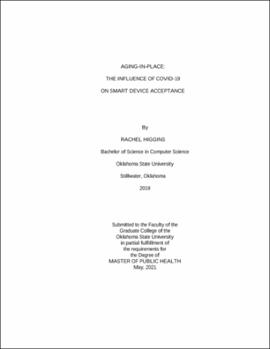| dc.contributor.advisor | Hubach, Randolph | |
| dc.contributor.author | Higgins, Rachel | |
| dc.date.accessioned | 2021-09-24T13:58:03Z | |
| dc.date.available | 2021-09-24T13:58:03Z | |
| dc.date.issued | 2021-05 | |
| dc.identifier.uri | https://hdl.handle.net/11244/330922 | |
| dc.description.abstract | COVID-19 and the increasing population of older adults in developed countries have increased the need for alternative solutions for preventative health and long-term care. Smart homes and other assistive technology have been proposed as a solution to detect health problems early and prevent major issues later, provide better care access through telemedicine solutions, and support the autonomy of older adults with cognitive or physical issues who wish to continue to live in their homes. Rural older adults' acceptance of assistive technology is understudied compared to other groups, but the few studies available indicated that many tend to reject it. However, COVID-19 may increase interest in the technology, and the goal of this project was to determine if rural Oklahoman older adults' acceptance of the technology has increased enough for it to be implemented. This is a qualitative study that used Grounded Theory coding to determine common themes of participants to determine the level of acceptance. Interviews indicated that acceptance is still low for some devices but that rural older Oklahomans may consider other remote health instruments for specific conditions, fall detection, and home security devices if recommended by a doctor and if their issues with the technology, such as self-image, independence, and financial concerns, were resolved. If the acceptance of these devices is increased in the future, it may be possible to provide better preventative care for rural Oklahomans, detecting problems early and treating the main issues to delay major health complications. This could narrow healthcare disparities between urban and rural older adults, especially during special situations like pandemics. | |
| dc.format | application/pdf | |
| dc.language | en_US | |
| dc.rights | Copyright is held by the author who has granted the Oklahoma State University Library the non-exclusive right to share this material in its institutional repository. Contact Digital Library Services at lib-dls@okstate.edu or 405-744-9161 for the permission policy on the use, reproduction or distribution of this material. | |
| dc.title | Aging-in-place: The influence of COVID-19 on smart device acceptance | |
| dc.contributor.committeeMember | Croff, Julie | |
| dc.contributor.committeeMember | Roberts, Emily | |
| osu.filename | Higgins_okstate_0664M_17122.pdf | |
| osu.accesstype | Open Access | |
| dc.type.genre | Thesis | |
| dc.type.material | Text | |
| dc.subject.keywords | aging in place | |
| dc.subject.keywords | assistive technology | |
| dc.subject.keywords | COVID-19 | |
| dc.subject.keywords | older adults | |
| dc.subject.keywords | remote health care | |
| dc.subject.keywords | telehealth | |
| thesis.degree.discipline | Public Health | |
| thesis.degree.grantor | Oklahoma State University | |
